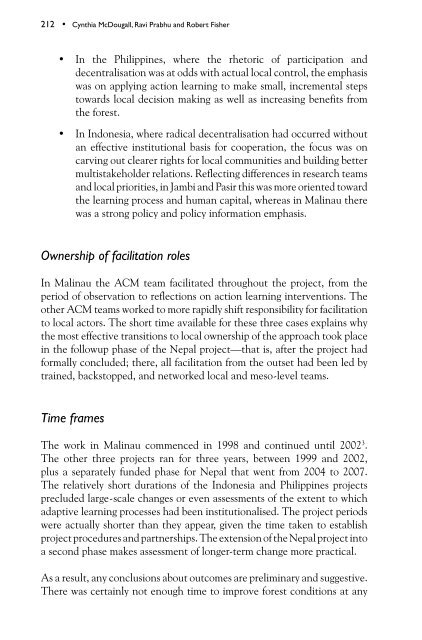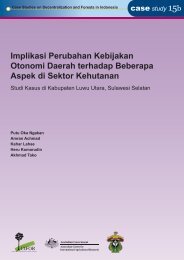Adaptive collaborative management of community forests in Asia ...
Adaptive collaborative management of community forests in Asia ...
Adaptive collaborative management of community forests in Asia ...
You also want an ePaper? Increase the reach of your titles
YUMPU automatically turns print PDFs into web optimized ePapers that Google loves.
212 • Cynthia McDougall, Ravi Prabhu and Robert Fisher<br />
• In the Philipp<strong>in</strong>es, where the rhetoric <strong>of</strong> participation and<br />
decentralisation was at odds with actual local control, the emphasis<br />
was on apply<strong>in</strong>g action learn<strong>in</strong>g to make small, <strong>in</strong>cremental steps<br />
towards local decision mak<strong>in</strong>g as well as <strong>in</strong>creas<strong>in</strong>g benefits from<br />
the forest.<br />
• In Indonesia, where radical decentralisation had occurred without<br />
an effective <strong>in</strong>stitutional basis for cooperation, the focus was on<br />
carv<strong>in</strong>g out clearer rights for local communities and build<strong>in</strong>g better<br />
multistakeholder relations. Reflect<strong>in</strong>g differences <strong>in</strong> research teams<br />
and local priorities, <strong>in</strong> Jambi and Pasir this was more oriented toward<br />
the learn<strong>in</strong>g process and human capital, whereas <strong>in</strong> Mal<strong>in</strong>au there<br />
was a strong policy and policy <strong>in</strong>formation emphasis.<br />
Ownership <strong>of</strong> facilitation roles<br />
In Mal<strong>in</strong>au the ACM team facilitated throughout the project, from the<br />
period <strong>of</strong> observation to reflections on action learn<strong>in</strong>g <strong>in</strong>terventions. The<br />
other ACM teams worked to more rapidly shift responsibility for facilitation<br />
to local actors. The short time available for these three cases expla<strong>in</strong>s why<br />
the most effective transitions to local ownership <strong>of</strong> the approach took place<br />
<strong>in</strong> the followup phase <strong>of</strong> the Nepal project—that is, after the project had<br />
formally concluded; there, all facilitation from the outset had been led by<br />
tra<strong>in</strong>ed, backstopped, and networked local and meso-level teams.<br />
Time frames<br />
The work <strong>in</strong> Mal<strong>in</strong>au commenced <strong>in</strong> 1998 and cont<strong>in</strong>ued until 2002 3 .<br />
The other three projects ran for three years, between 1999 and 2002,<br />
plus a separately funded phase for Nepal that went from 2004 to 2007.<br />
The relatively short durations <strong>of</strong> the Indonesia and Philipp<strong>in</strong>es projects<br />
precluded large-scale changes or even assessments <strong>of</strong> the extent to which<br />
adaptive learn<strong>in</strong>g processes had been <strong>in</strong>stitutionalised. The project periods<br />
were actually shorter than they appear, given the time taken to establish<br />
project procedures and partnerships. The extension <strong>of</strong> the Nepal project <strong>in</strong>to<br />
a second phase makes assessment <strong>of</strong> longer-term change more practical.<br />
As a result, any conclusions about outcomes are prelim<strong>in</strong>ary and suggestive.<br />
There was certa<strong>in</strong>ly not enough time to improve forest conditions at any
















